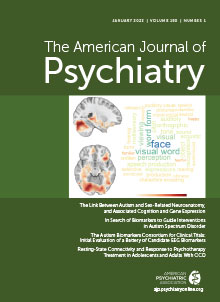Ned Kalin, M.D., editor-in-chief of the American Journal of Psychiatry, believes 2022 was another banner year for APA’s flagship journal. The 2022 editors’ picks, which appear in the January issue of the Journal, highlight nine papers from the year (including selections from the AJP Residents’ Journal) that Kalin and the deputy editors think are worth a second look.
“There were outstanding papers selected this year that showcase some of the cutting-edge tools and ideas being used in psychiatry,” said Kalin, who is also the Hedberg Professor and Chair of Psychiatry at the University of Wisconsin School of Medicine and Public Health.
Kalin selected a study in which researchers used brain organoids (tiny 3D structures that mimic many aspects of a fetal brain) to assess how stress hormones, such as cortisol, affect brain development.
“We know that stress and particularly early life stress is a very large risk factor for psychiatric illness later in life,” Kalin said. “Cerebral organoids are like living test tubes that enable researchers to recreate these aspects of these early life stressors and observe how developing neurons are impacted.”
He noted that the study of organoids can begin to answer questions about causality in mental illness in a way that other approaches, such as postmortem brain tissue analysis cannot.
“What makes organoids especially appealing … is that they are derived from adult human stem cells, so you can envision a future in which a patient donates some cells to make organoids which researchers can test to find treatments personalized to that individual,” Kalin said.
Brain tissue analysis continues to shape understandings of mental illness today and was utilized in two other studies picked by AJP editors. The first was a selection by Elisabeth Binder, M.D., Ph.D., in which researchers looked at gene expression data from brain samples from 325 people with posttraumatic stress disorder (PTSD), major depression, or controls with no history of either disorders. The researchers looked at two regions closely linked with these disorders (the prefrontal cortex and amygdala) and identified a significant overlap in the genes that had altered expression in people with PTSD or depression relative to controls. There were far fewer differences in gene expression in these brain regions that were unique to people with PTSD compared with those with depression.
In the second article, chosen by Carolyn Rodriguez, M.D., Ph.D., researchers compared the expression of proteins in a set of neurons called PVIs from brain samples from people with schizophrenia and a matched set of samples from people without psychiatric illness. PVIs function as nodes connecting memory-relevant circuits in the prefrontal cortex. The authors used computational models of cortical brain circuits to project how the changes in protein expression might impact brain activity. The computer model predicted that these expression changes likely reduced connection strength at these PVI nodes, which is associated with weakened working memory.
Kalin told Psychiatric News that the article chosen by Rodriguez demonstrates how using multiple, complementary laboratory techniques can lead to greater understandings of psychiatric illness. For example, researchers can use neuroimaging or brain tissue analyses to uncover key circuits and molecular pathways associated with psychiatric disorders, and then use model systems (computers, animals, or someday human organoids) to probe those pathways further and possibly identify treatment strategies.
Two other editor’s selections this year focused on long-term follow-up studies. The first, selected by Kathleen T. Brady, M.D., Ph.D., was a study that made use of New Zealand’s Dunedin Cohort which has been tracking over 1,000 individuals since age 3 years. This most recent set of data included MRI scans from participants now age 45. The authors found that long-term cannabis users (those who reported using cannabis at least once a week for multiple assessment periods) had more significant declines in processing speed, memory, and attention from childhood to midlife than non-cannabis users. Long-term cannabis users also had greater declines in these areas compared with long-term drinkers and smokers. The other long-term study, selected by David A. Lewis, M.D., was a 20-year follow-up of an Irish cohort of individuals enrolled after a first episode of psychosis. This study reaffirmed the value of early intervention, showing that reducing the period of untreated psychosis leads to sustained improvements in symptom severity, functioning, and quality of life.
Overseeing and retaining a cohort for decades can be difficult, noted Kalin, but these cohorts provide valuable data that can guide treatment and policy decisions.
AJP Residents’ Journal editor Danielle W. Lowe, M.D., Ph.D., wanted to spotlight two articles on transgender care from a special thematic issue in 2022 on minority mental health and the importance of respecting patient identity. The articles included a case report highlighting how gender dysphoria can impact the development of eating disorders and a piece highlighting some strategies to have more inclusive dialogue with transgender patients to reduce stigma. ■

